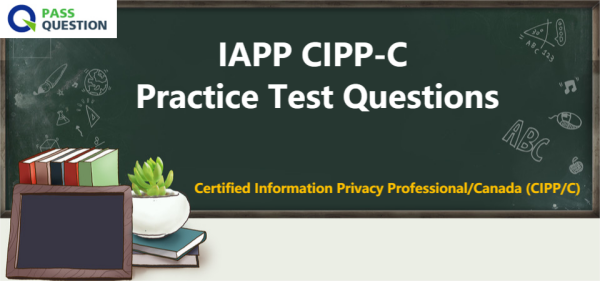IAPP CIPP-C Practice Test Questions - Certified Information Privacy Professional/Canada (CIPP/C)
To help you best preper for your Certified Information Privacy Professional/Canada (CIPP/C) exam. PassQuestion offers top quality IAPP CIPP-C Practice Test Questions that are suitable for every learning style for the preparation of Certified Information Privacy Professional/ Canada (CIPP/C) exam. Our IAPP CIPP-C Practice Test Questions will help you to understand these topics and obtain required skills & knowledge essential to pass your exam. If you are using our IAPP CIPP-C Practice Test Questions, then you will be able to get a clear idea of the real exam scenario. It will help you succeed in the CIPP/C Certification exam on the first attempt.

CIPP/C Certification
The Certified Information Privacy Professional/Canada (CIPP/C) certification assesses understanding and application of Canadian information privacy laws, principles and practices at the federal, provincial and territorial levels. A CIPP/C credential ensures you share common knowledge and understanding with your colleagues in related practice areas, including information security, marketing, IT, compliance and product development.
CIPP/C Examination Blueprint
Canadian Privacy Fundamentals
Canadian Privacy Laws and Practices in the Private Sector
Canadian Privacy Laws and Practices in the Public Sector
Canadian Privacy Laws and Practices—Health Sector
View Online Certified Information Privacy Professional/Canada CIPP/C Free Questions
Which of the following laws is NOT involved in the regulation of employee background checks?
A.The Civil Rights Act.
B.The Gramm-Leach-Bliley Act (GLBA).
C.The U.S. Fair Credit Reporting Act (FCRA).
D.The California Investigative Consumer Reporting Agencies Act (ICRAA).
Answer: B
The Family Educational Rights and Privacy Act (FERPA) requires schools to do all of the following EXCEPT?
A.Verify the identity of students who make requests for access to their records.
B.Provide students with access to their records within a specified amount of time.
C.Respond to all reasonable student requests regarding explanation of their records.
D.Obtain student authorization before releasing directory information in their records.
Answer: B
When developing a company privacy program, which of the following relationships will most help a privacy professional develop useful guidance for the organization?
A.Relationships with individuals within the privacy professional community who are able to share expertise and leading practices for different industries.
B.Relationships with clients, vendors, and customers whose data will be primarily collected and used throughout the organizational program.
C.Relationships with company leaders responsible for approving, implementing, and periodically reviewing the corporate privacy program.
D.Relationships with individuals across company departments and at different levels in the organization's hierarchy.
Answer: C
The FTC often negotiates consent decrees with companies found to be in violation of privacy principles. How does this benefit both parties involved?
A.It standardizes the amount of fines.
B.It simplifies the audit requirements.
C.It avoids potentially harmful publicity.
D.It spares the expense of going to trial.
Answer: C
What is the main reason some supporters of the European approach to privacy are skeptical about self- regulation of privacy practices?
A.A large amount of money may have to be sent on improved technology and security
B.Industries may not be strict enough in the creation and enforcement of rules
C.A new business owner may not understand the regulations
D.Human rights may be disregarded for the sake of privacy
Answer:B
If an organization certified under Privacy Shield wants to transfer personal data to a third party acting as an agent, the organization must ensure the third party does all of the following EXCEPT?
A.Uses the transferred data for limited purposes
B.Provides the same level of privacy protection as the organization
C.Notifies the organization if it can no longer meet its requirements for proper data handling
D.Enters a contract with the organization that states the third party will process data according to the consent agreement
Answer:D
What is the most likely reason that states have adopted their own data breach notification laws?
A.Many states have unique types of businesses that require specific legislation
B.Many lawmakers believe that federal enforcement of current laws has not been effective
C.Many types of organizations are not currently subject to federal laws regarding breaches
D.Many large businesses have intentionally breached the personal information of their customers
Answer:B
- TOP 50 Exam Questions
-
Exam
All copyrights reserved 2025 PassQuestion NETWORK CO.,LIMITED. All Rights Reserved.

